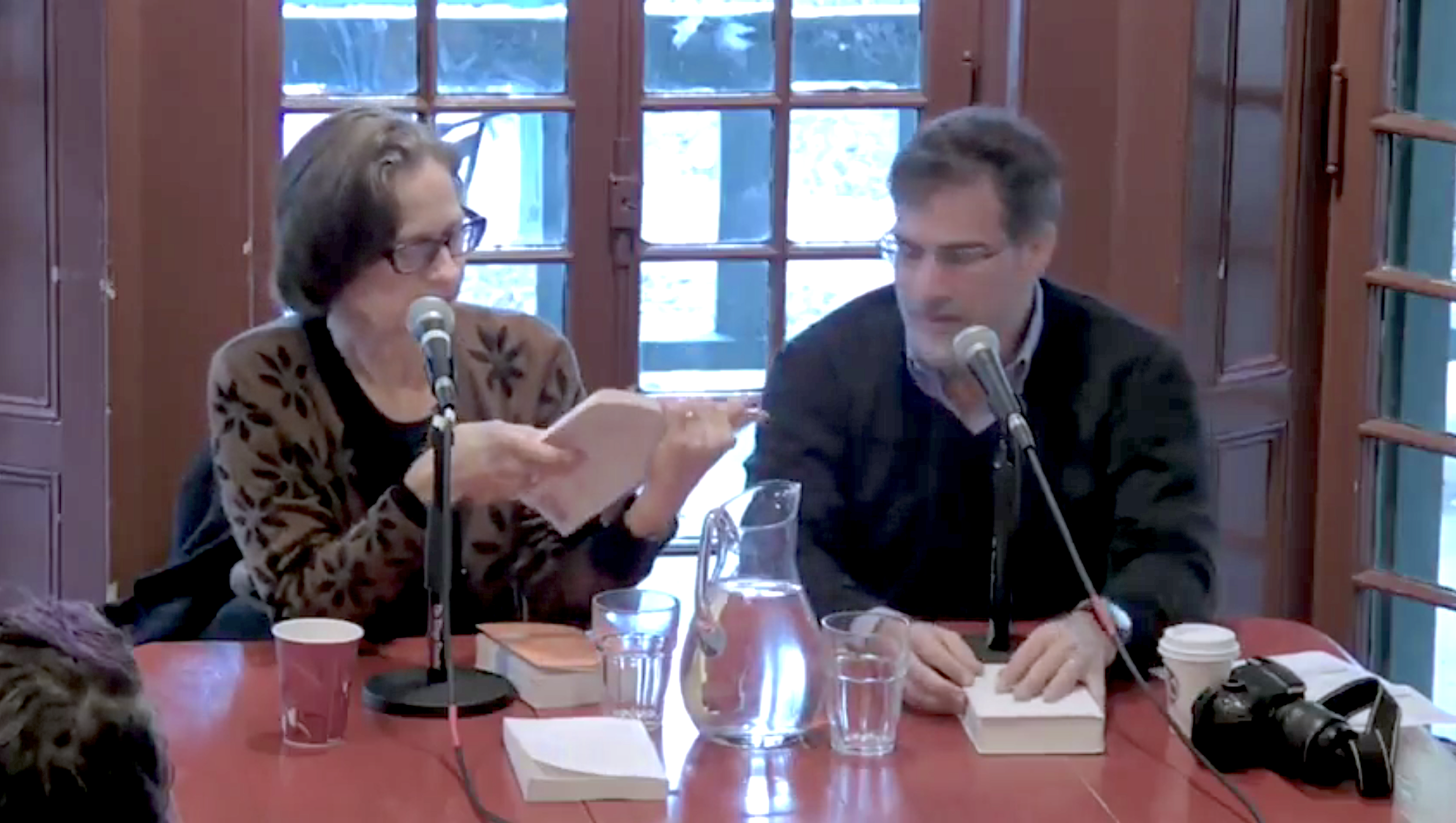
In 2017 I moderated an interview/conversation with Lydia Davis. At one point I asked her to read “In the Train Station,” a prose poem or microstory I have admired and puzzled over. Then she and I discussed it. A video clip of that exchange is here, below. The transcription was done by Regina Salmons. The text of the piece can be read here. Here is a link to a video recording of an 18-minute discussion of this piece with Anna Strong Safford and erica kaufman (the video is inside the ModPo site; one must register to watch). And here is a 35-minute collaborative close reading (with 20 people) of the same piece which I hosted in San Francisco.
Now the transcript of our conversation at the Kelly Writers House in 2017:
Davis reads “In the Train Station” at 23:38
[Audience gasping and making sounds of approval]
FILREIS
That’s pretty great.
DAVIS
So you asked me the other day if this was a dream. But it wasn’t a dream. It was absolutely the way it happened. But of course I enjoyed saying, you know, I show him the way. I’ve been interested in Buddhism for a long time. I’m not a practicing Buddhist, but I read about it, which has a great effect, even though I’m not practicing. So, as I told you, the dreams are — what I was interested in what sort of the borderline of an actual dream, and how you narrate a waking experience in life that is dreamlike.
And how do you narrate that? I wanted to sort of narrate the both the same way. So that it was a little unclear, sometimes it’s obvious that something has to be a dream. But other times it’s not, as in this case, this could be a dream, but it’s not. And they’re not only my own experiences, but friends’ experiences. So that became rather fun. I would collect dreams from friends or waking experiences they would tell me about, that would lend themselves … My friend Rachel had a — poet I like a lot — but she’s also a very old friend, she’s my oldest friend, we were twelve or thirteen or something.
Or anyways, she had experiences at her local bank that were kind of dreamlike. So some of you have read those, and I wrote the first ... you know, I asked her, can I use this please? Because she told me about this experience, and then, and then so she volunteered another experience. She said so I went to the bank again, here’s another experience if you want it.
FILREIS
You have the grammar of reporting a dream down in this so that it becomes, rather than a third person past tense, it’s a first person, it’s that ongoing present tense dream. That’s so great. What really wows me about this, Lydia, maybe it’s just too obvious, is the exchange of glances. He sees you seeing him. And then he comes and then instead of the big sense of the way, we get the Lydia Davis sense of the way, which is about how you get through life moment to moment and that becomes very Buddhist-ic.
And so I’ve just praised you, and there’s a question in there somewhere. I’m just so, aren’t you just so amazed at how she does that? It seems what you’re doing is that you’re reminding us that the mundanities and the details and the little things are the big things. That is the way.
DAVIS
Yeah, there is sort of a reciprocal, you know he might in some other context show me the way in a much larger and more important way. But in this little, this particular context, in this moment, I can show him the way. This little way.
FILREIS
And all the teaching that he can provide you isn’t going to be worth anything if he doesn’t catch his train on track three. His day, he won’t teach someone else, and you know what he needs. It’s just a great exchange of strangers that we see so often in your work.
DAVIS
And to me it leaves me the sort of cinematic impression, I see the crowd sort of milling and this one figure standing there. You know, looking at me. So it’s more cinematic than some.
FILREIS
It’s almost an anti-“In the Station of the Metro” Pound thing, where he is so aggressively seeing, and what he’s seeing is beautiful, except they get rendered as objects. Whereas you’re doing a beautiful inter-subjectivity in the same kind of whirly scene.
DAVIS
Can you quote that at all? I mean, inaccurately, something about a leaf and wet bough.
FILREIS
“In the Station of the Metro” … can we do it together? C’mon smartphones …
DAVIS
Oh no, don’t make them look at their phones.
FILREIS
These faces of, people in the … God we — should know this!
[Audience begins to recite the Pound poem.]
DAVIS
Leaves on a wet bough — yes, something about wet leaves, wet petals.
FILREIS
Wet petals on a black bough is the second line. These faces in the crowd.
LILY APPLEBAUM
The faces appear.
FILREIS
Apparitions. These faces in the crowd. Apparition is the key word there. It’s a very similar scene.
DAVIS
It’s only two lines, right?
FILREIS
Yeah, and it has all of the sort of condensation that you admire and it sort of helped launch a whole move in the largest sense of lineage, what might be thought of as informing what you’re trying to do as well. That modern condensation, and yet you’re doing something so different, because you’re actually interested in this saffron, not saffron, I invented that, this wine color, this incredible beautiful blur, but he’s standing still. There’s just motion and stillness. It’s just really good.
DAVIS
And the meeting of the eyes. And I was almost flattered, I’m sure of it, that he came to me.
